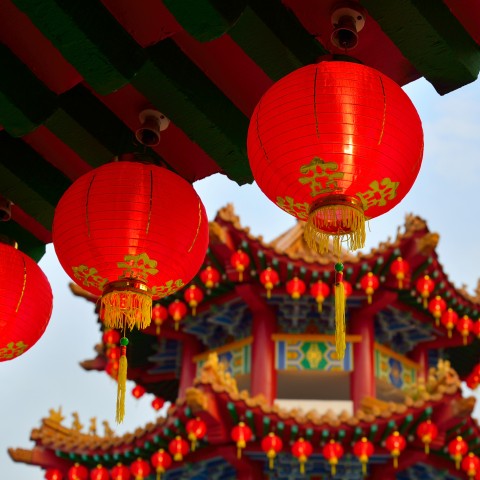
Let’s compare the following two sentences, which describe the same pretty girl:
- 这个女孩儿很漂亮。
Zhège nǚháir hěn piàoliang.
“This girl is very pretty.”
- 这位姑娘长发飘飘,亭亭玉立,宛如仙女下凡。
Zhè wèi gūniang chángfà piāopiāo, tíngtíng yùlì, wǎnrú xiānnǚ xiàfán.
“This girl, with her long hair flowing in the wind, is so slender and elegant that she is like a goddess descending to the earth.”
Which one has the WOW effect?
The second one, without any doubt, thanks to those carefully chosen and beautifully stacked four-character phrases.

Advanced Chinese phrases like these not only help depict vivid images and express deep meanings with few characters, but they also create a brisk and flowy rhythm.
Being able to properly use advanced four-character phrases manifests your Chinese language abilities, which could lead you to more opportunities. In this article, you’ll find a list of 40 advanced Chinese phrases of four characters each for use in various situations. You’ll also find two sample sentences for each phrase.
Before we get to our list, here’s a friendly reminder: You may know that the majority of Chinese idioms, or 成语 (chéngyǔ), are made up of four characters; however, not all four-character phrases are idioms. Many four-character phrases are the combination of two two-character words that are often associated with each other and said together, like a set phrase. Idioms or set phrases, they’re both great for advanced learners. 我们来者不拒! (Wǒmen láizhě bújù!) “All are welcome!”
Note: The phrases below marked with an asterisk * are not 成语 (chéngyǔ) “idioms” but 固定用语 (gùdìng yòngyǔ) “set phrases.”
 Table of Contents
Table of Contents
- 分析与推理 (fēnxī yǔ tuīlǐ) – Reasoning & Inference
- 推荐与自荐 (tuījiàn yǔ zìjiàn) – Recommendations & Self-recommendations
- 发言与领导力 (fāyán yú lǐngdǎo lì) – Public Speaking & Leadership
- 鼓励和赞扬 (gǔlì hé zànyáng) – Encouragement & Compliments
- Last But Not Least
1. 分析与推理 (fēnxī yǔ tuīlǐ) – Reasoning & Inference
Writing an essay or research paper is not an easy task. Choosing the right words and phrases for connecting facts and opinions is half the battle. Four-character phrases are perfect for this occasion due to their compact but profound nature. Here are some advanced-level Chinese phrases for making inferences and drawing conclusions for research papers, reports, and other formal texts.

- 显而易见 (xiǎn’éryìjiàn) – “obvious” / “obviously”
显而易见, 第二种方法比第一种更有效。
Xiǎn’éryìjiàn, dì èr zhǒng fāngfǎ bǐ dì yī zhǒng gèng yǒuxiào.
“Obviously, the second method is more efficient than the first one.”
第二种方法的有效性是显而易见的。
Dì èr zhǒng fāngfǎ de yǒuxiào xìng shì xiǎn’ér yìjiàn de.
“The effectiveness of the second method is obvious.”
- 相对而言 (xiāngduì éryán) – “comparatively” / “relatively speaking” *
相对而言,女孩儿的语言天赋比男孩儿的要强一些。
Xiāngduì éryán, nǚháir de yǔyán nénglì bǐ nánháir de yāo qiáng yīxiē.
“Relatively speaking, girls show more talent in languages than boys.”
相对而言,第一个预案对消费者会更有吸引力。
Xiāngduì éryán, dì yī gè yù’àn duì xiāofèizhě huì gèng yǒu xīyǐnlì.
“Comparatively, the first proposal could potentially attract more customers.”
- 相辅相成 (xiāngfǔ xiāngchéng) – “to complement one another”
知识的学习和应用相辅相成,相互促进。
Zhīshi de xuéxí hé yìngyòng xiāngfǔ xiāngchéng, xiānghù cùjìn.
“The acquisition and application of knowledge complement and benefit each other.”
这两点其实并不矛盾,而是相辅相成的。
Zhè liǎng diǎn qíshí bìng bù máodùn, ér shì xiāngfǔ xiāngchéng de.
“These two points, in fact, don’t contradict each other; instead, they complement each other.”
- 密不可分 (mìbù kěfēn) – “inseparable” / “closely related”
以上两个要素密不可分,缺一不可。
Yǐshàng liǎng gè yàosù mìbù kěfēn, quēyī bùkě.
“The above two factors are inseparable and indispensable.”
商家的诚信和口碑有着密不可分的联系。
Shāngjiā de chéngxìn hé kǒubēi yǒuzhe mìbù kěfēn de liánxì.
“The integrity of a business is closely linked to its reputation.”
- 诸如此类 (zhūrú cǐlèi) – “things like this” *
近几年有不少诸如此类的研究。
Jìn jǐ nián yǒu bù shǎo zhūrú cǐlèi de yánjiū.
“There have been quite a few studies like this in recent years.”
诸如此类的观点在作者的影评中也可以找到。
Zhūrú cǐlèi de guāndiǎn zài zuòzhě de yǐngpíng zhōng yě kěyǐ zhǎodào.
“Views like this can also be found in the writer’s movie reviews.”
- 与此同时 (yǔcǐ tóngshí) – “meanwhile” / “in the meantime” *
与此同时,房价的上涨维持在平均每年2.8%的水平。
Yǔcǐ tóngshí, fángjià de shàngzhǎng wéichí zài píngjūn měinián 2.8% de shuǐpíng.
“At the same time, the increase in housing prices has remained at an average annual rate of 2.8%.”
我们产品的销售量稳步增长,与此同时,我们的团队也壮大了许多。
Wǒmen chǎnpǐn de xiāoshòu liàng wěnbù zēngzhǎng, yǔcǐ tóngshí, wǒmen de tuánduì yě zhuàngdà le xǔduō.
“While the sales volume of our product has been growing steadily, our team has also grown a lot.”
- 由此可见 (yóucǐ kějiàn) – “it can be seen that…”
由此可见,这个结论存在极大的漏洞。
Yóucǐ kějiàn, zhège jiélùn cúnzài jí dà de lòudòng.
“It can be seen that there are huge loopholes in this conclusion.”
一个疏忽引发了整个系统的崩溃,由此可见,细节是多么重要。
Yīgè shūhū yǐnfāle zhěnggè xìtǒng de bēngkuì, yóucǐ kějiàn, xìjié shì duōme zhòngyào.
“An oversight triggered the collapse of the entire system, which shows how important details are.”
- 总而言之 (zǒng’ér yánzhī) – “all in all”
总而言之,电子产品给儿童的身心健康带来了负面影响。
Zǒng’ér yánzhī, diànzǐ chǎnpǐn gěi értóng de shēnxīn jiànkāng dàilái le fùmiàn yǐngxiǎng.
“All in all, electronic products have a negative impact on children’s physical and mental health.”
总而言之,新冠病毒在不断地变异。
Zǒng’ér yánzhī, xīnguān bìngdú zài búduàn de biànyì.
“All in all, the new coronavirus is constantly mutating.”
- 综上所述 (zòngshàng suǒshù) – “in summary” / “to conclude”
综上所述,人工智能不能替代真人翻译。
Zòngshàng suǒshù, réngōng zhǐ néng bùnéng tìdài zhēnrén fānyì.
“In summary, artificial intelligence cannot replace human translation.”
综上所述,能真正达到减重目的的方法只有两种。
Zòng shàng suǒ shù, néng zhēnzhèng dádào jiǎn zhòng mùdì de fāngfǎ zhǐyǒu liǎng zhǒng.
“In summary, there are only two ways to truly achieve the goal of weight loss.”
2. 推荐与自荐 (tuījiàn yǔ zìjiàn) – Recommendations & Self-recommendations
Four-character phrases also help create highlights in resumes, application letters, and recommendation letters. Plus, they allow you to pack a lot more information into the documentation when there are limitations on the page number and word count.
Below are some commonly used and powerful phrases describing personal and professional qualities that most Chinese employers look for.

- 认真负责 (rènzhēn fùzé) – “conscientious and responsible” *
黄浩然工作认真负责,一直以来是我们公司的榜样员工。
Huáng Hàorán gōngzuò rènzhēn fùzé, shì wǒmen gōngsī de bǎngyàng yuángōng.
“Haoran Huang is conscientious and responsible. He has been a model employee of our company.”
认真负责是我对自己的最低要求。
Rènzhēn fùzé shì wǒ duì zìjǐ de zuìdī yāoqiú.
“Being conscientious and responsible is the minimum requirement I have for myself.”
- 勤奋好学 (qínfèn hàoxué) – “diligent and studious”
第一次接触黄浩然,我就发现他是个非常勤奋好学的学生。
Dì yī cì jiēchù Huáng Hàorán, wǒ jiù fāxiàn tā shì ge fēicháng qínfèn hàoxué de xuéshēng.
“When I met Huang Haoran for the first time, I noticed right away that he is a very hardworking student.”
从小到大,勤奋好学都是老师和同学们对我的一致评价。
Cóngxiǎo dàodà, qínfèn hàoxué dōu shì lǎoshī hé tóngxué men duì wǒ de yīzhì píngjià.
“Growing up, I was always known as a diligent student among my teachers and classmates.”
- 谦虚谨慎 (qiānxū jǐnshèn) – “modest and cautious” *
谦虚谨慎是黄浩然最优秀的品质之一。
Qiānxū jǐnshèn shì Huáng Hàorán zuì yōuxiù de pǐnzhí zhī yī.
“Modesty is one of Huang Haoran’s best qualities.”
我始终认为,谦虚谨慎是为人处事的基本原则。
Wǒ shǐzhōng rènwéi, qiānxū jǐnshèn shì wéirén chǔshì de jīběn yuánzé.
“I have always believed that being modest and cautious are the basic principles of dealing with people and situations.”
- 乐观开朗 (lèguān kāilǎng) – “optimistic and cheerful” *
黄浩然乐观开朗,深受同事和客户的喜爱。
Huánghàorán lèguān kāilǎng, shēn shòu tóngshì hé kèhù de xǐ’ài.
“Huang Haoran is optimistic and cheerful, and he is popular among colleagues and customers.”
乐观开朗的性格让我在行业内外结交到很多朋友。
Lèguān kāilǎng de xìnggé ràng wǒ zài hángyè nèiwài jiéjiāo dào hěnduō péngyǒu.
“An optimistic and cheerful personality has allowed me to make many friends both inside and outside the industry.”
- 爱好广泛 (àihào guǎngfàn) – “extensive hobbies” *
爱好广泛的他,在团建活动中经常担任策划人的角色。
Àihào guǎngfàn de tā, zài tuán jiàn huódòng zhōng jīngcháng dānrèn cèhuà rén de juésè.
“With a wide range of hobbies, he often plays the role of planner in team-building activities.”
我的爱好广泛,包括足球、长跑、吉他、摄影等等。
Wǒ de àihào guǎngfàn, bāokuò zúqiú, chángpǎo, jítā, shèyǐng děngděng.
“I have a wide range of hobbies, including soccer, long-distance running, guitar, photography, etc.”
- 举一反三 (jǔyī fǎnsān) – “to deduce many things from one case” / “to learn by analogy”
正因为懂得举一反三,他的学习速度和能力比其他人高出许多。
Zhèng yīnwèi dǒngdé jǔyī fǎnsān, tā de xuéxí sùdù hé nénglì bǐ qítā rén gāo chū xǔduō.
“Just because he knows how to draw inferences, his learning speed and ability are much higher than others’. ”
我教给学生的不仅是书本上的知识,更是举一反三的学习习惯。
Wǒ jiāo gěi xuéshēng de bùjǐn shì shūběn shàng de zhīshì, gèng shì jǔyī fǎnsān de xuéxí xíguàn.
“What I teach students is not only the knowledge in books but also how to learn by analogy.”
- 善于沟通 (shànyú gōutōng) – “good at communication” *
善于沟通是他最大的闪光点。
Shànyú gōutōng shì tā zuìdà de shǎnguāng diǎn.
“Being good at communication is his strongest point.”
通过这次培训,我学会了善于沟通在团体中的重要作用。
Tōngguò zhè cì péixùn, wǒ xuéhuì le shànyú gōutōng zài tuántǐ zhōng de zhòngyào zuòyòng.
“This training has taught me the importance of good communication in a team.”
- 可塑性强 (kěsùxìng qiáng) – “flexible and adjustable” *
她虽然是新人,但是适应调整得很快,可塑性强。
Tā suīrán shì xīnrén, dànshì shìyìng tiáozhěng dé hěn kuài, kěsùxìng qiáng.
“Although she is a newcomer, she adapts quickly and is very flexible.”
我的可塑性强,只要有需要我的部门,我都愿意效力。
Wǒ de kěsùxìng qiáng, zhǐyào yǒu xūyào wǒ de bùmén, wǒ dū yuànyì xiàolì.
“I’m highly adaptable, and I am willing to work in any department that needs me.”
- 团队精神 (tuánduì jīngshén) – “teamwork” / “team spirit” *
她不仅业务能力强,还富有团队精神。
Tā bùjǐn qiānxū jǐnshèn, hái fùyǒu tuánduì jīngshén.
“Not only is she a professional, but she is also a great team player.”
本人乐观开朗,善于沟通,具有强烈的团队意识和团队精神。
Běnrén lèguān kāilǎng, shànyú gōutōng, jùyǒu qiángliè de tuánduì yìshí hé tuánduì jīngshén.
“I am optimistic and cheerful, good at communication, and have a strong sense of teamwork and team spirit.”
3. 发言与领导力 (fāyán yú lǐngdǎo lì) – Public Speaking & Leadership
Public speaking requires a higher level of language and communication skills. When giving a public speech, expressing opinions at a business meeting, or leading a team, you want to create connections, influence decisions, and motivate changes. At this point in your Chinese language learning, you’ll greatly benefit from picking up a few indispensable advanced phrases for these occasions.

- 齐心协力 (qíxīn xiélì) – “to work with a common purpose”
只要我们齐心协力,再艰巨的任务也难不倒我们。
Zhǐyào wǒmen qíxīn xiélì, zài jiānjù de rènwù yě nàn bù dǎo wǒmen.
“As long as we work together with a common purpose, no task is too difficult for us.”
虽然时间紧,任务重,大家加把劲儿,齐心协力地把这个项目做出来。
Suīrán shíjiān jǐn, rènwù zhòng, dàjiā jiā bǎ jìnr, qíxīn xiélì de bǎ zhège xiàngmù zuò chūlái.
“Although our schedule is tight and the task is enormous, let’s increase the momentum and work together to make this project happen.”
- 同舟共济 (tóngzhōu gòngjì) – “collaborate and help each other” (literally: “cross a river in the same boat”)
在面临巨大挑战之时,我们必须同舟共济,共度难关。
Zài miànlín jùdà tiǎozhàn zhī shí, wǒmen bìxū tóngzhōu gòngjì, gòngdù nánguān.
“When faced with great challenges, we must help each other and overcome difficulties together.”
这种同舟共济的情谊是难能可贵的。
Zhè zhǒng tóngzhōu gòngjì de qíngyì shì nánnéng kěguì de.
“The friendship of helping each other in difficult times is rare and precious.”
- 顾全大局 (gùquán dàjú) – “to take the big picture into consideration”
我对大家牺牲小我,顾全大局的举动表示由衷的感谢。
Wǒ duì dàjiā xīshēng xiǎowǒ, gùquán dàjú de jǔdòng biǎoshì yóuzhōng de gǎnxiè.
“I would like to express my heartfelt thanks to everyone for sacrificing their individual needs for the benefits of all.”
想要再上一个台阶,你得先学会如何顾全大局。
Xiǎng yào zài shàng yīgè táijiē, nǐ děi xiān xuéhuì rúhé gùquán dàjú.
“If you want to climb up the ladder to a higher position, you have to learn how to take the overall situation into consideration.”
- 有目共睹 (yǒumù gòngdǔ) – “for all to see”
我们产品的市场竞争力,大家都是有目共睹的。
Wǒmen chǎnpǐn de shìchǎng jìngzhēng lì, dàjiā dōu shì yǒumù gòngdǔ de.
“The market competitiveness of our products is obvious to all.”
我们对手的实力大家有目共睹,但是他们的短板大家同样是有目共睹的。
Wǒmen duìshǒu de shílì dàjiā yǒumù gòngdǔ, dànshì tāmen de duǎn bǎn dàjiā tóngyàng shì yǒumù gòngdǔ de.
“The strength of our opponents is obvious to all, but their shortcomings are also obvious to all.”
- 万无一失 (wànwú yīshī) – “complete success” / “nothing goes wrong”
为了确保此次活动万无一失地顺利进行,我们准备了一套正式方案和两套应急方案。
Wèile quèbǎo cǐ cì huódòng wànwú yīshī de shùnlì jìnxíng, wǒmen zhǔnbèi le yī tào zhèngshì fāng’àn hé liǎng tào yìngjí fāng’àn.
“In order to ensure the smooth progress and success of this event, we have prepared a formal plan and two emergency plans.”
这么做虽然不是万无一失,但是就算失败也是值得的。
Zhème zuò suīrán bùshì wànwú yīshī, dànshì jiùsuàn shībài yěshì zhídé de.
“It’s not guaranteed success, but it’d be worth the try even if you fail.”
- 集思广益 (jísī guǎngyì) – “collecting opinions for great benefit”
在这次的研讨会中,各部门同事集思广益,给我们的新项目出谋划策。
Zài zhè cì de yántǎo huì zhōng, gè bùmén tóngshì jísī guǎngyì, gěi wǒmen de xīn xiàngmù chūmóu huàcè.
“In this seminar, colleagues from all departments brainstormed ideas for our new project.”
作为决策者,我深知集思广益、群策群力的重要性。请大家畅所欲言。
Zuòwéi juécè zhě, wǒ shēn zhī jísī guǎngyì, qúncè qúnlì de zhòngyào xìng. Qǐng dàjiā chàngsuǒyùyán.
“As a decision-maker, I’m fully aware of the importance of brainstorming and teamwork. Please speak up freely.”
- 见仁见智 (jiànrén jiànzhì) – “opinions differ”
这和先有鸡还是先有蛋一样,答案都是见仁见智。
Zhè hé xiān yǒu jī háishì xiān yǒu dàn yīyàng, dá’àn dōu shì jiànrén jiànzhì.
“This is the same as the chicken or the egg. The answer will differ.”
到底什么是美?我相信这是一道见仁见智的议题。
Dàodǐ shénme shì měi? Wǒ xiāngxìn zhè shì yīdào jiànrén jiànzhì de yìtí.
“What is beauty anyway? I believe this is a matter of differing opinions.”
- 精益求精 (jīngyì qiújīng) – “to perfect something that is already outstanding”
精益求精是我们一直追求的目标。
Jīngyì qiújīng shì wǒmen yīzhí zhuīqiú de mùbiāo.
“Continuous improvement is the goal we have been pursuing.”
马克同志精益求精的工作态度是值得我们所有人学习的。
Mǎkè tóngzhì jīngyì qiújīng de gōngzuò tàidù shì zhídé wǒmen suǒyǒu rén xuéxí de.
“Comrade Mark’s work attitude of excellence is something we all learn from.”
- 互惠互利 (hùhuì hùlì) – “mutual benefit”
这次合作采用的是降低成本,互惠互利的双赢模式。
Zhè cì hézuò cǎiyòng de shì jiàngdī chéngběn, hùhuì hùlì de shuāngyíng móshì.
“This cooperation adopts a win-win model of reducing costs and creating mutual benefit.”
当然,我们签订的任何承诺和合约都是以互惠互利为前提的。
Dāngrán, wǒmen qiāndìng de rènhé chéngnuò hé héyuē dōu shì yǐ hùhuì hùlì wéi qiántí de.
“Of course, any promises and contracts we sign are premised on mutual benefit.”
- 重中之重 (zhòngzhōng zhīzhòng) – “of highest priority”
此次员工培训的重中之重是安全生产。
Cǐ cì yuángōng péixùn de zhòngzhōng zhīzhòng shì ānquán shēngchǎn.
“The top priority of this employee training is safety in production.”
如果说培养孩子良好的性格是重点,那么教会他们站在别人的角度看问题则是重中之重。
Rúguǒ shuō péiyǎng háizi liánghǎo dì xìnggé shì zhòngdiǎn, nàme jiào huì tāmen zhàn zài biérén de jiǎodù kàn wèntí zé shì zhòngzhōng zhīzhòng.
“If cultivating children’s good character is a priority, then teaching them to look at problems from the perspective of others is the highest priority.”
- 或多或少 (huòduō huòshǎo) – “more or less”
不得不说,公司的声誉或多或少都受到了这次事件的影响。
Bùdé bù shuō, gōngsī de shēngyù huòduō huòshǎo dōu shòudào le zhè cì shìjiàn de yǐngxiǎng.
“I have to say that the company’s reputation has been more or less affected by this incident.”
我们或多或少都听到了一些不太悦耳的声音。
Wǒmen huòduō huòshǎo dōu tīng dào le yīxiē bù tài yuè’ěr de shēngyīn.
“We’ve all heard some unpleasant sounds, although the amount may differ.”
4. 鼓励和赞扬 (gǔlì hé zànyáng) – Encouragement & Compliments
Giving compliments and encouraging words is an art. Four-character Chinese phrases can make your compliments and encouragements nice and brief while still keeping them specific.

- 全力以赴 (quánlì yǐfù) – “to make an all-out effort”
希望这次考试同学们都全力以赴,取得理想的成绩。
Xīwàng zhè cì kǎoshì tóngxuémen dōu quánlì yǐfù, qǔdé lǐxiǎng de chéngjì.
“I hope that all the students in this exam will go all out to achieve ideal results.”
虽然我们没能击败对手,但是大家全力以赴,顽强拼搏的精神还是非常值得鼓励的。
Suīrán wǒmen méi néng jībài duìshǒu, dànshì dàjiā quánlì yǐfù, wánqiáng pīnbó de jīngshén háishì fēicháng zhídé gǔlì de.
“Although we failed to beat our opponents, the fact that everyone went all out and fought to the very end deserves compliments and encouragement.”
- 一鼓作气 (yīgǔ zuòqì) – “in a spurt of energy”
我们团队一鼓作气,连续72小时工作,在截止日期前提交了方案。
Wǒmen tuánduì yīgǔ zuòqì, liánxù 72 xiǎoshí gōngzuò, zài jiézhǐ rìqī qián tíjiāo le fāng’àn.
“Our team worked nonstop for 72 hours and submitted the proposal before the deadline.”
留给我们的时间不多了,我们只能一鼓作气地奋战到底。
Liú gěi wǒmen de shíjiān bù duō le, wǒmen zhǐ néng yīgǔ zuòqì de fènzhàn dàodǐ.
“There is not much time left for us, and we can only fight to the end in one go.”
- 再接再厉 (zàijiē zàilì) – “to persist”
这次考试成绩不错,要保持这个势头,再接再厉。
Zhè cì kǎoshì chéngjī bùcuò, yào bǎochí zhège shìtóu, zàijiē zàilì.
“The test results are good; we must maintain this momentum and make persistent efforts.”
为你完美的表现点赞,请再接再厉,给我们更多的惊喜。
Wèi nǐ wánměi de biǎoxiàn diǎn zàn, qǐng zàijiē zàilì, gěi wǒmen gèng duō de jīngxǐ.
“Good job on your perfect performance; please make persistent efforts and give us more surprises.”
- 卷土重来 (juǎntǔ chónglái) – “to make a comeback”
没选上也不要灰心,有机会一定可以卷土重来的。
Méi xuǎn shàng yě bùyào huīxīn, yǒu jīhuì yīdìng kěyǐ juǎntǔ chónglái de.
“Don’t be discouraged that you didn’t get chosen; when there’s another chance, you can definitely make a comeback.”
大家拿出卷土重来的决心和气势,不要让对手小看我们。
Dàjiā ná chū juàntǔ chónglái de juéxīn hé qìshì, bùyào ràng duìshǒu xiǎo kàn wǒmen.
“Let us show our determination and momentum to make a comeback, and don’t let our opponents underestimate us.”
- 笨鸟先飞 (bènniǎo xiānfēi) – “work hard to compensate for one’s limited abilities” (literally: “the clumsy bird flies early”)
你要懂得只要努力,就能笨鸟先飞。
Nǐ yào dǒngdé zhǐyào nǔlì, jiù néng bènniǎo xiānfēi.
“You have to understand that as long as you work hard, you can still beat the others.”
没有什么好担心的,笨鸟先飞的例子有的是。
Méiyǒu shénme hǎo dānxīn de, bènniǎo xiānfēi de lìzi yǒudeshì.
“There’s nothing to worry about. There are so many examples of clumsy birds flying early.”
- 熟能生巧 (shúnéng shēngqiǎo) – “practice makes perfect”
都说熟能生巧,多练习练习,上台就不紧张了。
Dōu shuō shúnéng shēngqiǎo, duō liànxí liànxí, shàngtái jiù bù jǐnzhāng le.
“People say that practice makes perfect; practice more, and you will not be nervous on stage.”
凡事都是这样的,做得多了,就熟能生巧了。
Fánshì dōu shì zhèyàng de, zuò dé duō le, jiù shúnéng shēngqiǎo le.
“Everything is like this: the more you do it, the better you will be.”
- 顺其自然 (shùnqí zìrán) – “let nature take its course”
没事儿,你该做的都做了,只能顺其自然,耐心等待了。
Méishìr, nǐ gāi zuò de dōu zuòle, zhǐ néng shùnqí zìrán, nàixīn děngdài le.
“It’s okay. You have done everything you need to do; you can only let the flow take its course and wait.”
顺其自然挺好的。强扭的瓜不甜。
Shùn qí zìrán tǐng hǎo de. Qiáng niǔ de guā bù tián.
“It’s good to let nature take its course. You can take a horse to the water, but you cannot make him drink.” (literally: “The twisted melon is not sweet.”)
- 画龙点睛 (huàlóng diǎnjīng) – “to add the vital finishing touch” (literally: “to dot the eyes of a painted dragon”)
哇,你加的这一句词简直是画龙点睛,太牛了。
Wa, nǐ jiā de zhè yījù cí jiǎnzhí shì huàlóng diǎnjīng, tài niú le.
“Wow, this sentence you added is the finishing touch. It’s awesome.”
最后这个调整真是画龙点睛,整个画面都生动了起来。
Zuìhòu zhège tiáozhěng zhēnshi huàlóng diǎnjīng, zhěnggè huàmiàn dōu shēngdòng le qǐlái.
“The final adjustment is really the finishing touch, and the whole picture is vivid now.”
- 耳目一新 (ěrmù yīxīn) – “a refreshing change”
小李的演讲让在场的诸位都有耳目一新的感觉。
Xiǎo lǐ de yǎnjiǎng ràng zàichǎng de zhūwèi dōu yǒu ěrmù yīxīn de gǎnjué.
“Xiao Li’s speech gave everyone present a refreshing feeling.”
我不得不说,你的这个改变太让人耳目一新了。
Wǒ bùdé bù shuō, nǐ de zhège gǎibiàn tài ràng rén ěrmù yīxīn le.
“I have to say, this change of yours is so refreshing.”
- 当之无愧 (dāngzhī wúkuì) – “fully deserving”
你是我们心中当之无愧的第一名。
Nǐ shì wǒmen xīnzhōng dāngzhī wúkuì de dì yī míng.
“You are the well-deserved number one in our hearts.”
你这个组长是全票通过的,当之无愧。
Nǐ zhège zǔzhǎng shì quánpiào tōngguò de, dāngzhī wúkuì.
“You won all the votes and so deserve the title of group leader.”
- 脱颖而出 (tuōyǐng érchū) – “to rise above others”
能在这么多有实力的新人中脱颖而出,你的实力是有目共睹的。
Néng zài zhème duō yǒu shílì de xīnrén zhōng tuōyǐng érchū, nǐ de shílì shì yǒumù gòngdǔ de.
“Being able to stand out among so many capable newcomers, your capabilities are obvious to all.”
恭喜你在几轮面试后脱颖而出,被我司顺利录取。
Gōngxǐ nǐ zài jǐ lún miànshì hòu tuōyǐng érchū, bèi wǒ sī shùnlì lùqǔ.
“Congratulations on standing out after a few rounds of interviews and successfully being accepted by our company.”
5. Last But Not Least
For those of you who’d like to explore more content for the advanced level, be sure to check out Level 5 on ChineseClass101.com. This is a curated pathway designed for advanced Chinese learners, featuring level-appropriate content along with hand-graded assignments to recap what you’ve learned.
Don’t forget that you’ll get your own personal tutor with a Premium PLUS subscription. This will help bring your Chinese to the native level at a much faster pace!
机不可失,赶快行动吧!(Jībù kěshī, gǎnkuài xíngdòng ba!) – Don’t miss the opportunity. Subscribe now!













 Table of Contents
Table of Contents
















